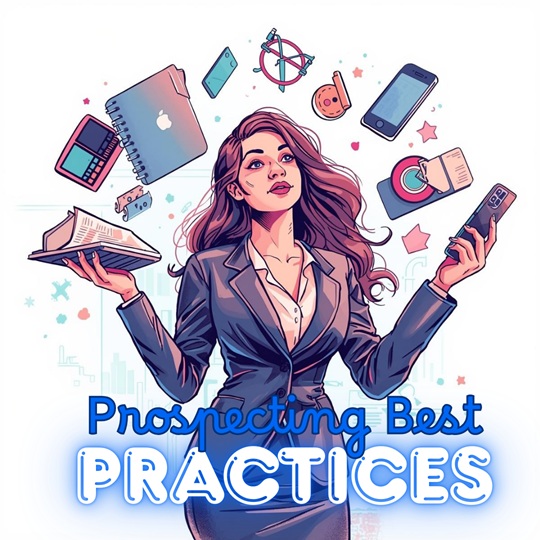Cold calling can be a challenging yet essential sales technique for businesses looking to generate leads and drive sales. But so many salespeople hate it. In fact, roughly 63% of sales reps say they hate cold calling the most out of anything else they do on the job.
While directly cold-calling someone may seem daunting, especially if you’re a new SDR (Sales Development Rep), there are quite a few easily avoidable mistakes that you can dodge and improve your chances of success.
In this article, we'll explore ten common pitfalls to steer clear of when cold calling so you don’t have to fear the dialer and you can have more productive conversations with possible customers.
1. Lack of Preparation
One of the biggest mistakes on a cold call is inadequate preparation. Take the time to research the prospect, understand their business, and identify potential pain points. When you prepare relevant talking points and sales discovery questions and do your research ahead of the call, you show your professionalism and expertise, increasing your chances of success.
2. Overwhelming the Prospect With Information
Avoid bombarding people with excessive information during the initial call. Too much info leads to a “No.” Instead, focus on capturing their attention with a concise value proposition that highlights how your product or service can solve their problems or enhance their business.
3. Talking Too Much
While sharing relevant information is important, talking too much can be detrimental. After all, cold calling is an opportunity to engage prospects in a conversation, not talk someone to sleep. So, actively listen to their needs and concerns, give them the space to express themselves, and ask questions. Effective communication is a two-way street.
4. Using Generic Scripts
Using generic scripts can make your calls sound robotic and impersonal. Instead, aim for a more authentic approach. Develop conversational cold call script frameworks that allow flexibility and adaptability, enabling you to tailor your conversation to each prospect's unique situation.
5. Lack of Confidence
Confidence is crucial on a cold call because it reinforces trust and credibility. If you sound doubtful, prospects will likely question the value of your product or service. To avoid sounding unsure of yourself, practice your pitch beforehand and memorize your key talking points, so when you’re on the phone, you’re at ease, and not worrying about what to say next. Remember, your belief in your product or service will inspire confidence in the prospect.
6. Failure to Listen
A common pitfall with cold calling is launching into a sales pitch without actively listening to the prospect. Remember, listening is critical to understanding a prospect's needs and objections. Avoid interrupting or dominating the conversation because a successful cold call is a conversation, not a monologue. Take the time to listen to their needs, challenges, and objectives so you can tailor your pitch accordingly to address concerns and show that you understand the prospect’s unique situation.
7. Overlooking Relationship Building
Avoid treating your sales calls like they’re transactions and nothing more. Cold calling isn't just about making an immediate sale. Cold calls are an opportunity to build a relationship with a potential customer. Instead, focus on establishing rapport and trust. Show genuine interest in the prospect's business and be personable. When you focus on building a connection, you give yourself a better shot at fostering a long-term business partnership.
8. Ignoring Rejection
Rejection is an inevitable part of cold calling. But how you handle rejection on a sales call makes the difference between a top performer and the middle of the pack. Instead of getting discouraged, view it as an opportunity to learn and improve. Analyze the reasons for rejection, refine your approach, and maintain a positive mindset. Remember: Every "No" brings you one step closer to a "Yes."
9. Pushy or Aggressive Behavior
While a quick and efficient cold call closes deals, rushing through the call, pushing too hard for a sale, or being aggressive in tone can quickly turn off prospects. Take the time to build rapport and allow the prospect to share their thoughts and concerns. Respect their boundaries and be mindful of their time. Approach the call with a consultative mindset, aiming to understand their needs rather than forcing a sale. Building trust and demonstrating genuine interest will yield better results.
10. Forgetting to Follow Up
Many potential leads require nurturing over time, so following up is crucial during the cold-calling process. Failing to follow up after a cold call is truly a missed opportunity, especially when you consider that on average, it takes six to eight calls to turn a prospect into a customer. As good practice, always discuss the next steps or actions while you’re on the call and take note of the follow-up you have to do on your end. Whether it's sending additional information, a real-time calendar invite, scheduling a meeting, arranging a callback, or periodically sending personalized emails to stay on the prospect’s radar, be consistent with your follow-up because it can turn a lukewarm lead into a hot opportunity.
Bonus Cold Call Tips
Before you hit the dialer, here are additional cold call mistakes to avoid...
Talking Too Fast
Speaking too quickly can overwhelm and confuse the prospect. Don’t…forget…to….slow…down (see what we did there?). Enunciate clearly. And maintain a calm and confident tone because it’s one of the essential skills of a salesperson. When you give the prospect space to process the information you share, you create a more engaging and comfortable dialogue.
Using Jargon or Complex Language
No matter how new or seasoned you are with sales and marketing, this is a mistake we all make: Heavy Jargon. It can be so easy to slip into the complicated jargon in your industry because it’s more comfortable to spout off some industry words like “MRR” or “Churn Rate” than to actually explain concepts to prospects. But please avoid using technical jargon or complex language that the prospect may not understand. Instead, make it your goal to talk in such clear and simple terms that a 10-year-old could understand you.
Neglecting to Address Objections
People may have concerns or objections during a cold call– it’s inevitable. Our natural reaction when we come across a new idea or product is to push back. But ignoring or dismissing these objections only makes you look bad, and it puts up a wall between you and the prospect. Instead, when the prospect raises objections, address them with empathy, get to the root of the issue, and provide relevant information that will hopefully alleviate their concerns.
Failing to Highlight Value
Highlighting the unique value of your product or service is crucial on a cold call. Avoid generic statements and focus on the specific benefits that address the prospect's pain points. By emphasizing the value they stand to gain, you capture their attention and make a compelling case for your offering.
















